MGT600 Reflective Analysis: Managing People and Teams Concepts
VerifiedAdded on 2023/04/07
|5
|924
|446
Report
AI Summary
This reflective analysis report, submitted for the MGT600 Management, People, and Teams module, explores key concepts of motivation and conflict management, including Maslow's theory, expectancy theory, and the Thomas Kilmann Conflict Management theory. The student discusses the relevance of these concepts in a workplace context, highlighting their importance in understanding employee behavior, driving engagement, and resolving conflicts. The analysis demonstrates an understanding of content and process theories of motivation, various motivational options, and conflict management techniques. The student reflects on how this knowledge will be applied in future roles to improve interpersonal dynamics, build cooperative environments, and effectively manage teams. The report also includes a brief introduction, discussion, conclusion, and references to support the analysis.
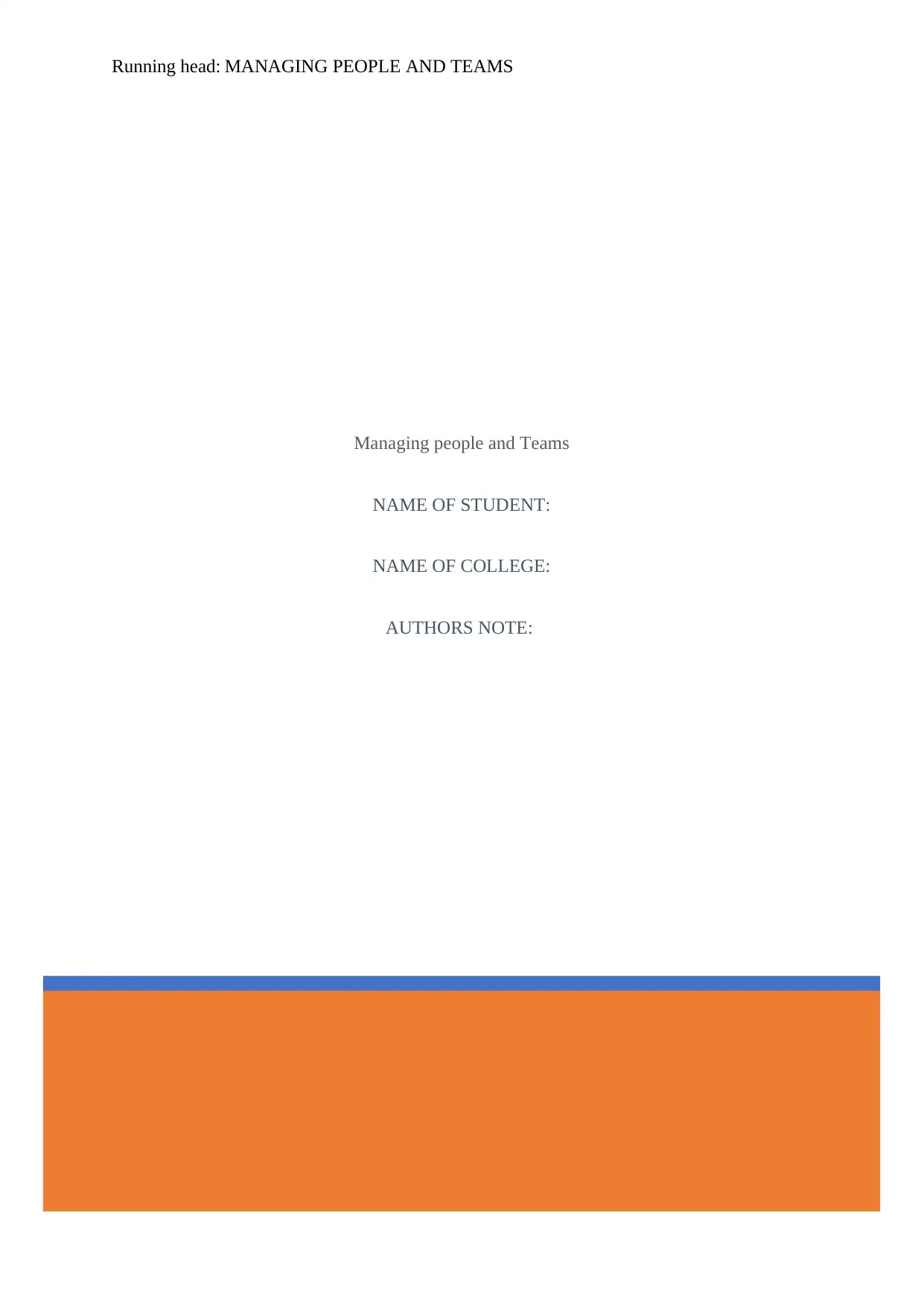
Managing people and Teams
NAME OF STUDENT:
NAME OF COLLEGE:
AUTHORS NOTE:
Running head: MANAGING PEOPLE AND TEAMS
NAME OF STUDENT:
NAME OF COLLEGE:
AUTHORS NOTE:
Running head: MANAGING PEOPLE AND TEAMS
Paraphrase This Document
Need a fresh take? Get an instant paraphrase of this document with our AI Paraphraser
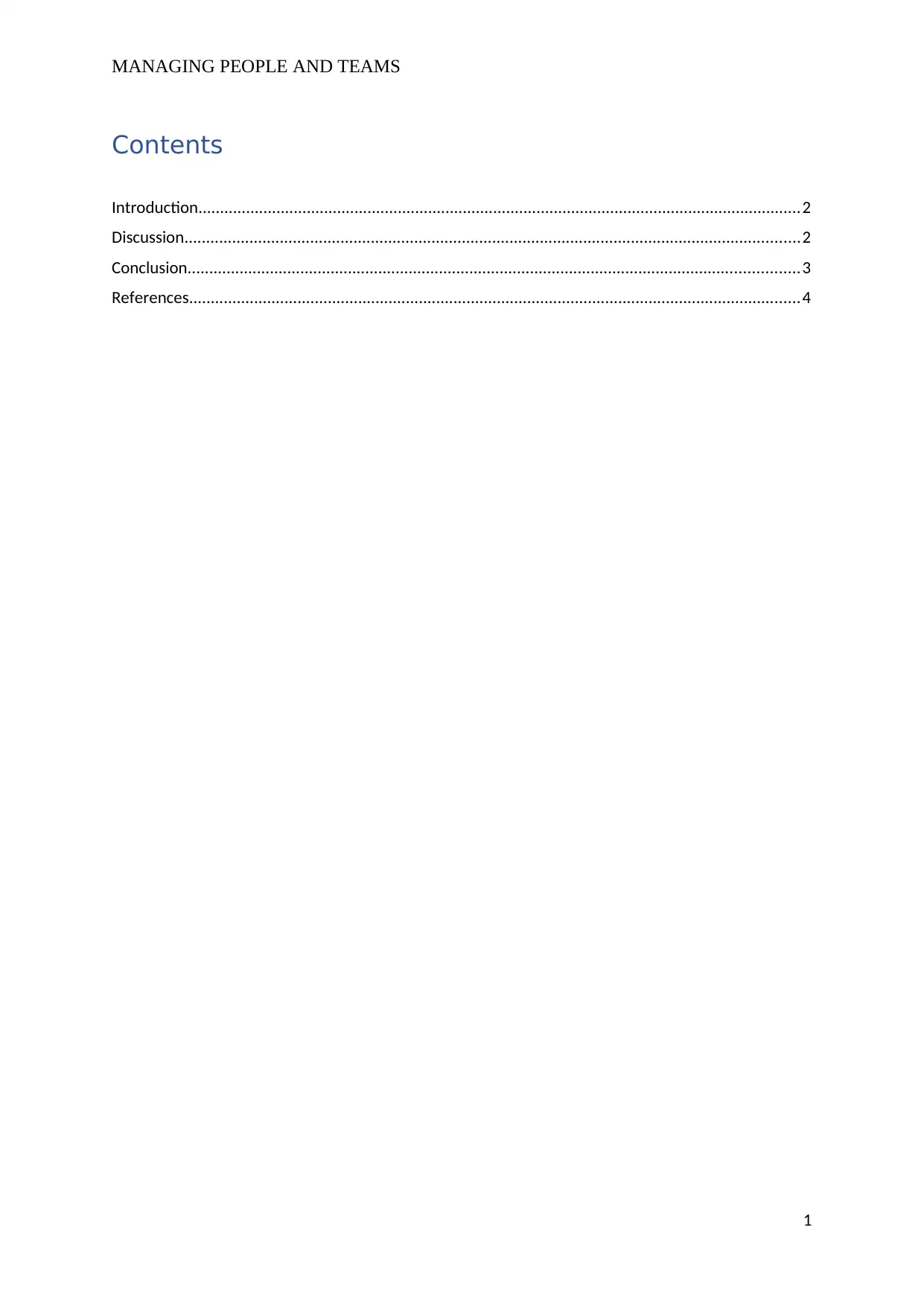
MANAGING PEOPLE AND TEAMS
Contents
Introduction...........................................................................................................................................2
Discussion..............................................................................................................................................2
Conclusion.............................................................................................................................................3
References.............................................................................................................................................4
1
Contents
Introduction...........................................................................................................................................2
Discussion..............................................................................................................................................2
Conclusion.............................................................................................................................................3
References.............................................................................................................................................4
1
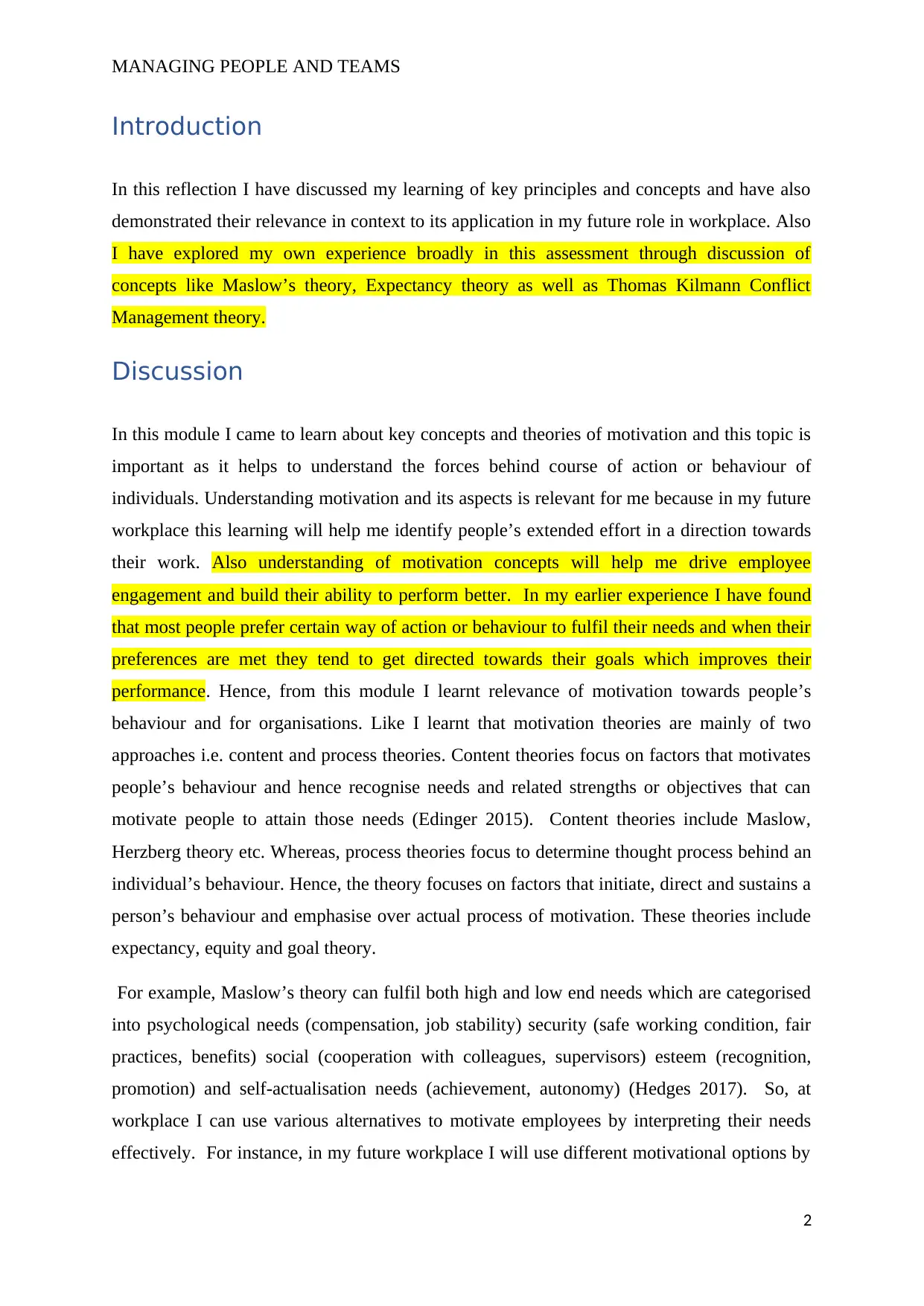
MANAGING PEOPLE AND TEAMS
Introduction
In this reflection I have discussed my learning of key principles and concepts and have also
demonstrated their relevance in context to its application in my future role in workplace. Also
I have explored my own experience broadly in this assessment through discussion of
concepts like Maslow’s theory, Expectancy theory as well as Thomas Kilmann Conflict
Management theory.
Discussion
In this module I came to learn about key concepts and theories of motivation and this topic is
important as it helps to understand the forces behind course of action or behaviour of
individuals. Understanding motivation and its aspects is relevant for me because in my future
workplace this learning will help me identify people’s extended effort in a direction towards
their work. Also understanding of motivation concepts will help me drive employee
engagement and build their ability to perform better. In my earlier experience I have found
that most people prefer certain way of action or behaviour to fulfil their needs and when their
preferences are met they tend to get directed towards their goals which improves their
performance. Hence, from this module I learnt relevance of motivation towards people’s
behaviour and for organisations. Like I learnt that motivation theories are mainly of two
approaches i.e. content and process theories. Content theories focus on factors that motivates
people’s behaviour and hence recognise needs and related strengths or objectives that can
motivate people to attain those needs (Edinger 2015). Content theories include Maslow,
Herzberg theory etc. Whereas, process theories focus to determine thought process behind an
individual’s behaviour. Hence, the theory focuses on factors that initiate, direct and sustains a
person’s behaviour and emphasise over actual process of motivation. These theories include
expectancy, equity and goal theory.
For example, Maslow’s theory can fulfil both high and low end needs which are categorised
into psychological needs (compensation, job stability) security (safe working condition, fair
practices, benefits) social (cooperation with colleagues, supervisors) esteem (recognition,
promotion) and self-actualisation needs (achievement, autonomy) (Hedges 2017). So, at
workplace I can use various alternatives to motivate employees by interpreting their needs
effectively. For instance, in my future workplace I will use different motivational options by
2
Introduction
In this reflection I have discussed my learning of key principles and concepts and have also
demonstrated their relevance in context to its application in my future role in workplace. Also
I have explored my own experience broadly in this assessment through discussion of
concepts like Maslow’s theory, Expectancy theory as well as Thomas Kilmann Conflict
Management theory.
Discussion
In this module I came to learn about key concepts and theories of motivation and this topic is
important as it helps to understand the forces behind course of action or behaviour of
individuals. Understanding motivation and its aspects is relevant for me because in my future
workplace this learning will help me identify people’s extended effort in a direction towards
their work. Also understanding of motivation concepts will help me drive employee
engagement and build their ability to perform better. In my earlier experience I have found
that most people prefer certain way of action or behaviour to fulfil their needs and when their
preferences are met they tend to get directed towards their goals which improves their
performance. Hence, from this module I learnt relevance of motivation towards people’s
behaviour and for organisations. Like I learnt that motivation theories are mainly of two
approaches i.e. content and process theories. Content theories focus on factors that motivates
people’s behaviour and hence recognise needs and related strengths or objectives that can
motivate people to attain those needs (Edinger 2015). Content theories include Maslow,
Herzberg theory etc. Whereas, process theories focus to determine thought process behind an
individual’s behaviour. Hence, the theory focuses on factors that initiate, direct and sustains a
person’s behaviour and emphasise over actual process of motivation. These theories include
expectancy, equity and goal theory.
For example, Maslow’s theory can fulfil both high and low end needs which are categorised
into psychological needs (compensation, job stability) security (safe working condition, fair
practices, benefits) social (cooperation with colleagues, supervisors) esteem (recognition,
promotion) and self-actualisation needs (achievement, autonomy) (Hedges 2017). So, at
workplace I can use various alternatives to motivate employees by interpreting their needs
effectively. For instance, in my future workplace I will use different motivational options by
2
⊘ This is a preview!⊘
Do you want full access?
Subscribe today to unlock all pages.

Trusted by 1+ million students worldwide
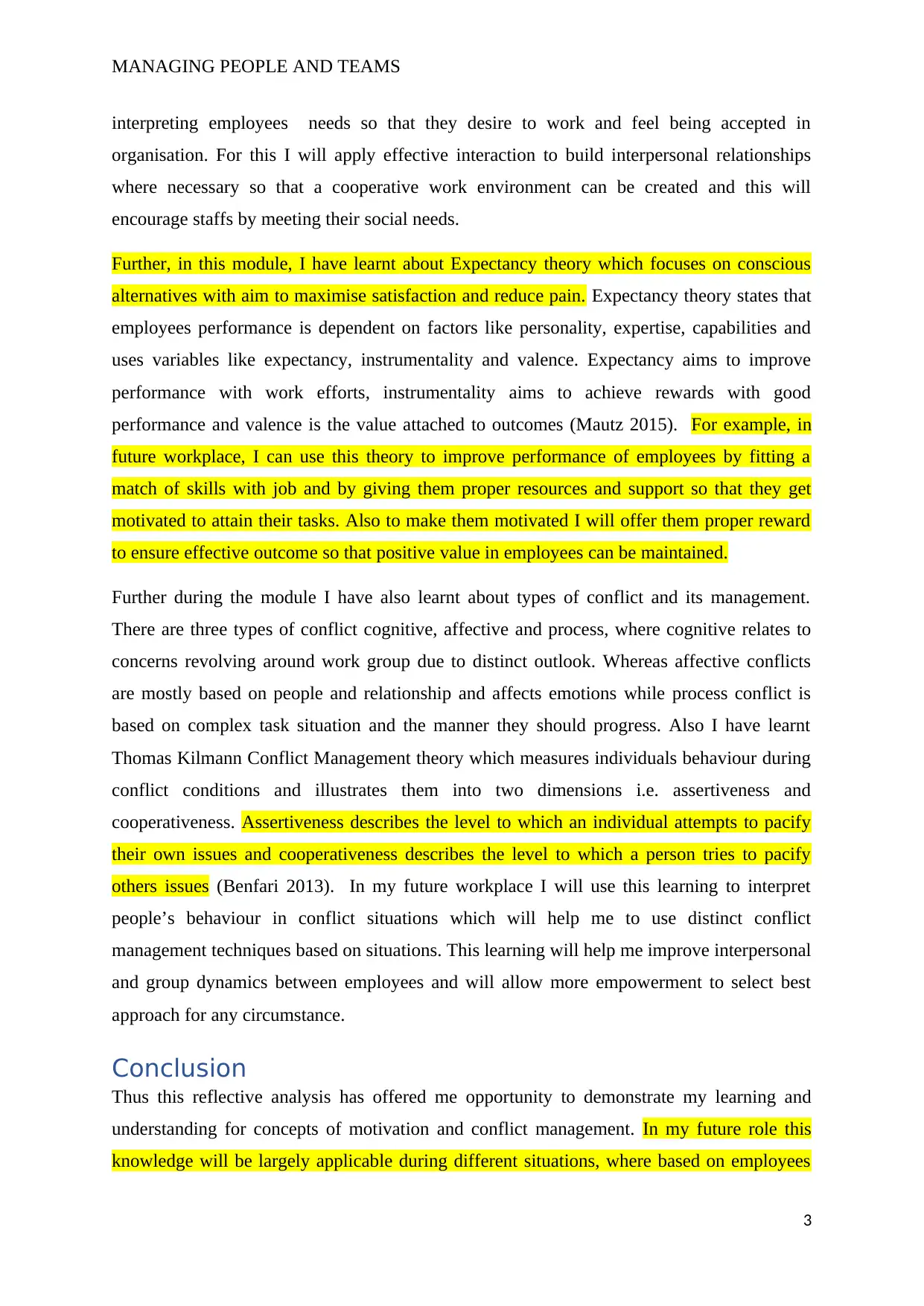
MANAGING PEOPLE AND TEAMS
interpreting employees needs so that they desire to work and feel being accepted in
organisation. For this I will apply effective interaction to build interpersonal relationships
where necessary so that a cooperative work environment can be created and this will
encourage staffs by meeting their social needs.
Further, in this module, I have learnt about Expectancy theory which focuses on conscious
alternatives with aim to maximise satisfaction and reduce pain. Expectancy theory states that
employees performance is dependent on factors like personality, expertise, capabilities and
uses variables like expectancy, instrumentality and valence. Expectancy aims to improve
performance with work efforts, instrumentality aims to achieve rewards with good
performance and valence is the value attached to outcomes (Mautz 2015). For example, in
future workplace, I can use this theory to improve performance of employees by fitting a
match of skills with job and by giving them proper resources and support so that they get
motivated to attain their tasks. Also to make them motivated I will offer them proper reward
to ensure effective outcome so that positive value in employees can be maintained.
Further during the module I have also learnt about types of conflict and its management.
There are three types of conflict cognitive, affective and process, where cognitive relates to
concerns revolving around work group due to distinct outlook. Whereas affective conflicts
are mostly based on people and relationship and affects emotions while process conflict is
based on complex task situation and the manner they should progress. Also I have learnt
Thomas Kilmann Conflict Management theory which measures individuals behaviour during
conflict conditions and illustrates them into two dimensions i.e. assertiveness and
cooperativeness. Assertiveness describes the level to which an individual attempts to pacify
their own issues and cooperativeness describes the level to which a person tries to pacify
others issues (Benfari 2013). In my future workplace I will use this learning to interpret
people’s behaviour in conflict situations which will help me to use distinct conflict
management techniques based on situations. This learning will help me improve interpersonal
and group dynamics between employees and will allow more empowerment to select best
approach for any circumstance.
Conclusion
Thus this reflective analysis has offered me opportunity to demonstrate my learning and
understanding for concepts of motivation and conflict management. In my future role this
knowledge will be largely applicable during different situations, where based on employees
3
interpreting employees needs so that they desire to work and feel being accepted in
organisation. For this I will apply effective interaction to build interpersonal relationships
where necessary so that a cooperative work environment can be created and this will
encourage staffs by meeting their social needs.
Further, in this module, I have learnt about Expectancy theory which focuses on conscious
alternatives with aim to maximise satisfaction and reduce pain. Expectancy theory states that
employees performance is dependent on factors like personality, expertise, capabilities and
uses variables like expectancy, instrumentality and valence. Expectancy aims to improve
performance with work efforts, instrumentality aims to achieve rewards with good
performance and valence is the value attached to outcomes (Mautz 2015). For example, in
future workplace, I can use this theory to improve performance of employees by fitting a
match of skills with job and by giving them proper resources and support so that they get
motivated to attain their tasks. Also to make them motivated I will offer them proper reward
to ensure effective outcome so that positive value in employees can be maintained.
Further during the module I have also learnt about types of conflict and its management.
There are three types of conflict cognitive, affective and process, where cognitive relates to
concerns revolving around work group due to distinct outlook. Whereas affective conflicts
are mostly based on people and relationship and affects emotions while process conflict is
based on complex task situation and the manner they should progress. Also I have learnt
Thomas Kilmann Conflict Management theory which measures individuals behaviour during
conflict conditions and illustrates them into two dimensions i.e. assertiveness and
cooperativeness. Assertiveness describes the level to which an individual attempts to pacify
their own issues and cooperativeness describes the level to which a person tries to pacify
others issues (Benfari 2013). In my future workplace I will use this learning to interpret
people’s behaviour in conflict situations which will help me to use distinct conflict
management techniques based on situations. This learning will help me improve interpersonal
and group dynamics between employees and will allow more empowerment to select best
approach for any circumstance.
Conclusion
Thus this reflective analysis has offered me opportunity to demonstrate my learning and
understanding for concepts of motivation and conflict management. In my future role this
knowledge will be largely applicable during different situations, where based on employees
3
Paraphrase This Document
Need a fresh take? Get an instant paraphrase of this document with our AI Paraphraser
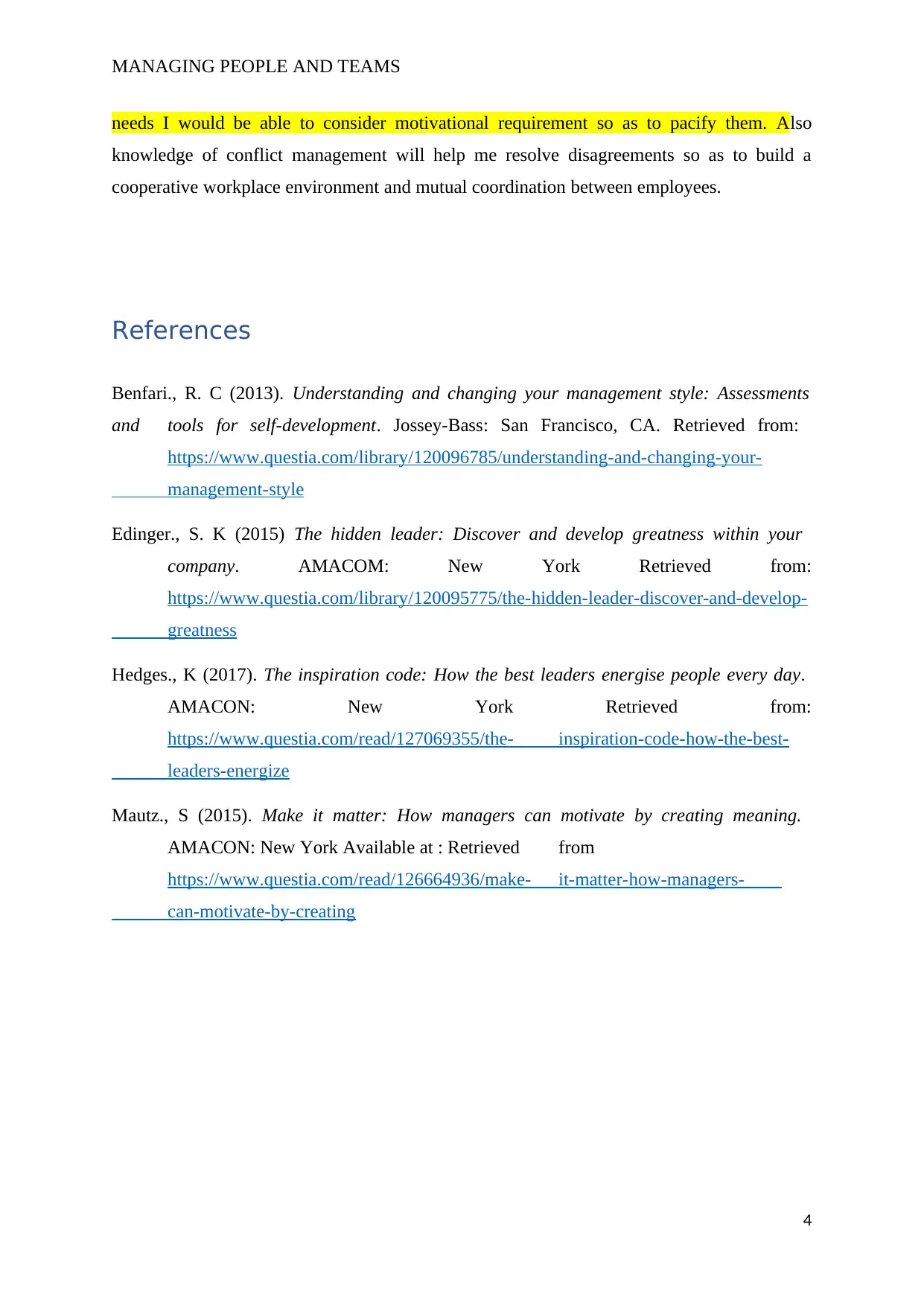
MANAGING PEOPLE AND TEAMS
needs I would be able to consider motivational requirement so as to pacify them. Also
knowledge of conflict management will help me resolve disagreements so as to build a
cooperative workplace environment and mutual coordination between employees.
References
Benfari., R. C (2013). Understanding and changing your management style: Assessments
and tools for self-development. Jossey-Bass: San Francisco, CA. Retrieved from:
https://www.questia.com/library/120096785/understanding-and-changing-your-
management-style
Edinger., S. K (2015) The hidden leader: Discover and develop greatness within your
company. AMACOM: New York Retrieved from:
https://www.questia.com/library/120095775/the-hidden-leader-discover-and-develop-
greatness
Hedges., K (2017). The inspiration code: How the best leaders energise people every day.
AMACON: New York Retrieved from:
https://www.questia.com/read/127069355/the- inspiration-code-how-the-best-
leaders-energize
Mautz., S (2015). Make it matter: How managers can motivate by creating meaning.
AMACON: New York Available at : Retrieved from
https://www.questia.com/read/126664936/make- it-matter-how-managers-
can-motivate-by-creating
4
needs I would be able to consider motivational requirement so as to pacify them. Also
knowledge of conflict management will help me resolve disagreements so as to build a
cooperative workplace environment and mutual coordination between employees.
References
Benfari., R. C (2013). Understanding and changing your management style: Assessments
and tools for self-development. Jossey-Bass: San Francisco, CA. Retrieved from:
https://www.questia.com/library/120096785/understanding-and-changing-your-
management-style
Edinger., S. K (2015) The hidden leader: Discover and develop greatness within your
company. AMACOM: New York Retrieved from:
https://www.questia.com/library/120095775/the-hidden-leader-discover-and-develop-
greatness
Hedges., K (2017). The inspiration code: How the best leaders energise people every day.
AMACON: New York Retrieved from:
https://www.questia.com/read/127069355/the- inspiration-code-how-the-best-
leaders-energize
Mautz., S (2015). Make it matter: How managers can motivate by creating meaning.
AMACON: New York Available at : Retrieved from
https://www.questia.com/read/126664936/make- it-matter-how-managers-
can-motivate-by-creating
4
1 out of 5
Related Documents
Your All-in-One AI-Powered Toolkit for Academic Success.
+13062052269
info@desklib.com
Available 24*7 on WhatsApp / Email
![[object Object]](/_next/static/media/star-bottom.7253800d.svg)
Unlock your academic potential
Copyright © 2020–2026 A2Z Services. All Rights Reserved. Developed and managed by ZUCOL.



